Atlantic Monthly Contributors's Blog, page 415
June 13, 2015
Warrior Women and Clickhole: The Week in Pop-Culture Writing

A Warrior Woman’s Work
Jess Zimmerman | Hazlitt
“[Furiosa] manages to be the quintessential male action hero: bold, self-sacrificing, grease-smudged, practically dressed, violent as needed, nobody’s love interest, and willing to fight uncompromisingly to protect those who need her help. She just happens to do all this while being a woman—and in doing so, reminds us that none of these ‘masculine’ qualities actually require a man.”
Dinner With my Big Gay Family at the Old Spaghetti Factory
Drew Zandonella-Stannard | Eater
“The Old Spaghetti Factory has been the venue for every reunion where we gather as a loud lesbian mafia, greeted by dozens of perky young servers who welcome without question our battery of separate checks.”
Wow. ClickHole.
Dan Lois | Slate
“Sure, ClickHole plays at playing the traffic game, espousing a comic ethos of shameless pandering. But ClickHole also frequently publishes Web content that goes viral because it is extremely funny and great.”

The Small-Town Advantage
Sam Riches | Pacific Standard
“As a kid, the fantasies of going pro were not yet understood as fantasies. No one cared how infinitesimally small the chances of being a professional athlete actually were. The naivety kept the dream protected. It kept hockey fun.”
The Unkillable Demon King
Mina Kimes | ESPN
“In Seoul, where eSports are more popular with teenagers than baseball, Faker became a household name. He starred in a commercial for SK Telecom, striding toward the camera in slow motion. The Internet birthed a hashtag, #thingsfakerdoes. Some League fans nicknamed him the Unkillable Demon King; others simply referred to him as God.”
Rex ’n’ FX: The Charming Jurassic World
Wesley Morris | Grantland
“There was ... the sense that the movies had found ways of making money off of TV while also calling TV stupid. By comparison, movies have always been self-consecrating. You don’t go back to Star Wars in order to shit on it. You go back because the congregation demands a snazzier church. I’m not sure who’s been clamoring for another Jurassic Park. And that lack of urgency takes pressure off the movie.”
Dudes Are Falling in Love With Lululemon: Meet the Lululemen
Sapna Maheswari | Buzzfeed
“Getting men to buy clothes once exclusively worn by women is a very tough sell. While pretty much any macho sports or surf brand can slap a logo on a women’s T-shirt and stand a good chance of gaining traction, there are few precedents for a women’s brand being proudly worn by guys—think college guys in Lilly Pulitzer shorts, or ballplayers wearing Victoria’s Secret boxers.”
Heroin, Too Close
Richard Brody | The New Yorker
“Without sentimentalizing the characters of Heaven Knows What, and without romanticizing addiction or dereliction in any way, the Safdies achieve an immediate contact with experience itself, making the film a radical act of sympathy that nonetheless doesn’t suspend or defy judgment.”









June 12, 2015
Why Americans Are Turning Against Free Trade
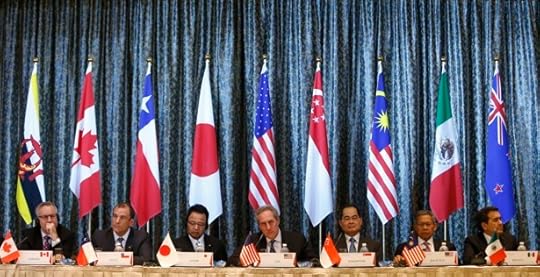
A decade and a half ago, I filled my days writing speeches urging Congress to grant President George W. Bush fast-track trade authority. If memory serves, I wrote more speeches on that one subject than on any other. Obviously, I didn’t earn my pay: Despite Republican majorities in both Houses, Congress balked.
This past year, President Obama has worked as hard for fast-track authority as President Bush ever did. It now seems that his efforts will prove as unavailing. This time, if anything, the loss is even more heartbreaking, because the prize in reach is bigger than anything on offer in 2001-2002: a Trans-Pacific Partnership on trade.
TPP matters both to the American economy and to American security. China’s admission to the World Trade Organization in 2001 was necessary and unavoidable. How can you sustain a multilateral-trade regime without including the world’s largest exporter and second-largest importer? But the price of China’s inclusion in the WTO was the paralysis of the multilateral trade regime that had evolved since the 1940s: Trade-liberalization negotiations that included China just became too difficult.
The Trans-Pacific Partnership tries to work around China’s obstructionism by limiting the next round of trade liberalization to 11 highly congenial countries: Australia, Brunei, Canada, Chile, Japan, Malaysia, Mexico, New Zealand, Peru, Singapore, the United States, and Vietnam. Not all are liberal democracies, but all are committed to a more open global-trading regime. Even more than the U.S.-Canada trade agreement of 1988, which was widened to include Mexico in 1994, TPP is intended to be an “open architecture” agreement, to which other countries can adhere in future if they so wish. In other words, while the door is open to China, the house is being built to non-Chinese specifications and without China’s veto. Since the TPP states together represent not only 40 percent of the world economy, but also many of China’s largest trade partners, the agreement will constrain China’s future trade behavior. TPP thus asserts Western and American will and power against an often-recalcitrant China.
Related Story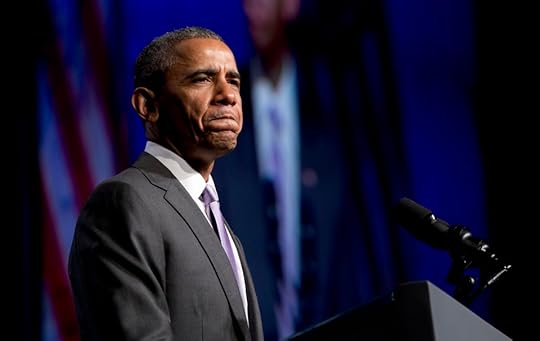
TPP also will accelerate economic growth among the member nations. The importance of trade to the U.S. economy can be oversold—in my speech writing days, I was surely guilty of this to some degree—but by any definition, it’s significant and becoming more so. The slowdown in developed world growth since the late 1990s has many causes beyond the stall in trade liberalization. But the stall in trade liberalization has not helped.
The natural tendency of democratic societies is gradually to accumulate barriers to international trade. The Bush administration itself exemplified this: At the same time as it pleaded for fast-trade authority, it imposed restrictions on foreign steel. Relentless international action on trade liberalization offsets equally relentless domestic pressure for trade protection.
Freer trade is always a tough vote. As long ago as the 1960s, Barry Goldwater tried to make a campaign issue out of John F. Kennedy’s allegedly excessive trade liberalization. Yet from the 1940s through the 1990s, freer trade benefited from the almost unanimous elite consensus in its favor—and the strong public instinct to defer to elites when unanimous.
That deference has eroded. A recent Pew Research poll found that although 58 percent of Americans felt that free trade benefits the national economy, just 43 percent thought such deals benefited their own families finances. And pluralities of Americans believe that free trade slows economic growth, lowers wages, and leads to job losses.
These are responses that cause economists to roll their eyes. But most of us aren’t economists. We know what we experience—and what most Americans have experienced are many more foreign products on their shelves, a half-decade of weak job growth for Americans, and stagnating or declining living standards for all but the wealthiest.
Economic and political leaders can argue that the nation’s economic troubles are not traceable to free trade—that Americans would have been even worse off if they reverted to protectionism. The trouble is that Americans no longer trust their leaders. If polls can be relied upon, trust in leaders and institutions has plunged to the lowest levels ever recorded, lower even than during the dismal days of the mid-1970s.
The belief that the economic system is rigged in favor of the wealthy and that ordinary people can no longer get ahead run is especially intense. Americans increasingly perceive the rich getting richer, the poor getting poorer. Their view of business corporations has turned especially hostile, very nearly as hostile as their view of government.
Trade is a pro-growth policy. But when the proceeds of growth are not widely shared, and not perceived as widely shared, it becomes difficult to sustain the consensus in favor of pro-growth measures—especially when those measures seem to impose costs on American workers. That’s the warning in today’s congressional action.









The 2016 U.S. Presidential Race: A Cheat Sheet

Hillary Clinton is not—despite what some of her aides and allies apparently want people to believe—kicking off her campaign Saturday.
As you may recall, that actually happened back in April. Her campaign is somewhat confusingly describing this as the “official” kickoff, which doesn’t make a great deal of sense, since what made the race official was her filing legal documents. Since then she’s been traveling the country, speaking with voters in Iowa and New Hampshire; attending fundraisers; giving speeches; and hitting up the odd Chipotle.
It’s true, however, that she hasn’t offered a major speech since she announced her run with a video. (She dropped a new video, “Fighter,” as an appetizer for Saturday’s speech.) Clinton has a clear task for the speech, and a reason for wanting to bill it as a major moment. In 2008, she and her team felt she had to prove that she had what it takes to run for president and to run the country. While she didn’t win, she seemed to prove that point, and her term as secretary of state—despite the criticisms she drew—imbued her with additional gravitas.
But while she has shown she’s able, she still hasn’t offered a compelling reason for why she wants to be president. Saturday’s speech—on Roosevelt Island in New York City—seems like a chance to lay out a rationale for the Clinton campaign. Clinton’s early stumbles, and the size of the challenge she faces within the Democratic Party, still seem overstated, but to win over voters and win a general election, she’ll need a compelling story.
Clinton is a candidate who already announced but is acting as though she didn’t. On the Republican side of the ledger, her poll-leading counterpart is Jeb Bush, who’s done the reverse: He’s been acting like a candidate for months but isn’t one officially. That will change on Monday, when he makes his campaign official in Miami.
With so many candidates in the mix—some announced, some soon to announce, and some still on the fence—it’s tough to keep track of it all. To help out with that, this cheat sheet on the state of the presidential field will be periodically updated throughout the campaign season. Here's how things look right now.
* * *
The Democrats Wikimedia
Wikimedia Hillary Clinton
Who is she? As if we have to tell you, but: She’s a trained attorney; former secretary of State in the Obama administration; former senator from New York; and former first lady.
Is she running? Yes.
Who wants her to run? Most of the Democratic Party.
Can she win the nomination? Duh.
What else do we know? Maybe a better question, after so many years with Clinton on the national scene, is what we don't know. Here are 10 central questions to ask about the Hillary Clinton campaign.
Does her website have a good 404 page? If you’re tolerant of bad puns and ’90s outfits, the answer is yes.
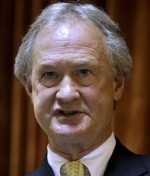 Steven Senne / AP
Steven Senne / AP Lincoln Chafee
Who is he? The son of beloved Rhode Island politician John Chafee, Linc took his late father’s seat in the U.S. Senate, serving as a Republican. He was governor, first as an independent and then as a Democrat.
Is he running? Yes—he announced his run at George Mason University on June 3.
Who wants him to run? Beyond metric-system boosters? No one knows! Even in Rhode Island, Chafee doesn’t have much support—he opted not to seek reelection as governor in 2014, in part because his approval rating had reached a dismal 26 percent.
Can he win the nomination? No. Chafee seems to be positioning himself as an economic populist and says Clinton's 2002 vote for the Iraq war should disqualify her (he was the only Republican senator to vote against it). In other words: He's Jim Webb with a less impressive resume, a less compelling bio (he's the son of longtime Senator John Chafee), and less of a political base. He gives himself even odds, though.
Does his website have a good 404 page? No.
 Wikimedia
Wikimedia Martin O'Malley
Who is he? He’s a former governor of Maryland and mayor of Baltimore.
Is he running? Yes. He announced his campaign on May 30.
Who wants him to run? Not clear. He has some of the leftism of Bernie Sanders or Elizabeth Warren, but without the same grassroots excitement.
Can he win the nomination? At the moment, O’Malley seems caught between Sanders, who has grasped the progressive mantle, and Clinton, who dominates the Democratic race overall. As with Sanders, though, it’s hard to see where O'Malley would get an opening unless Clinton’s campaign fell apart. The conventional wisdom since protests over the death of Freddie Gray is that protests in Baltimore undermine the case for his candidacy and make it harder for him to run, but he’s embraced the protests as a motivation for his run.
What else do we know? Have you heard that he plays in a Celtic rock band? You have? Oh.
Does his website have a good 404 page? No.
 Wikimedia
Wikimedia Bernie Sanders
Who is he? A self-professed socialist, Sanders represented Vermont in the U.S. House from 1991 to 2007, when he won a seat in the Senate.
Is he running? Yes. He announced April 30.
Who wants him to run? Far-left Democrats; socialists; Brooklyn-accent aficionados.
Can he win the nomination? It remains extremely difficult to see him winning the nomination, on the basis that primary voters tend to gravitate to “electable” general-election candidates alone. But he’s proven an ability to poll well into double digits, and he has a fired-up grassroots base. If nothing else, his campaign seems to be succeeding in getting his progressive ideas into the mix.
Does his website have a good 404 page? Yes, and it is quintessentially Sanders.
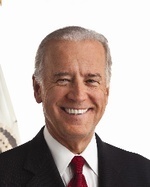 Wikimedia
Wikimedia Joe Biden
Who is he? Biden, a longtime Delaware senator, is vice president and foremost American advocate for aviator sunglasses and passenger rail.
Is he running? He won't rule it out, but he's made no serious steps toward a run.
Who wants him to run? Joe Biden, maybe. The group Draft Biden (slogan: “I’m Ridin’ With Biden”) continues to do its best.
Can he win the nomination? If Clinton didn't run, it would throw the Democratic field into disarray. But probably not.
When will he announce? It seems ever more likely that he won't.
 Wikimedia
Wikimedia Jim Webb
Who is he? Webb is a Vietnam war hero and secretary of the Navy. The author of several books, he served as a senator from Virginia from 2007 to 2013.
Is he running? He has launched an exploratory committee.
Who wants him to run? Dovish Democrats; socially conservative, economically populist Democrats; the Anybody-But-Hillary camp.
Can he win the nomination? Probably not.
Does his website have a good 404 page? No.
 Wikimedia
Wikimedia Elizabeth Warren
Who is she? Warren has taken an improbable path from Oklahoma, to Harvard Law School, to progressive heartthrob, to Massachusetts senator.
Is she running? No. Seriously, no.
Who wants her to run? Progressive Democrats; economic populists, disaffected Obamans, disaffected Bushites.
Can she win the nomination? No, because she's not running.
* * *
The Republicans Gage Skidmore
Gage Skidmore Rick Perry
Who is he? George W. Bush’s successor as governor of Texas, he entered the 2012 race with high expectations, but sputtered out quickly. He left office in 2014 as the Lone Star State’s longest-serving governor.
Is he running? Yes. He announced on June 4.
Who wants him to run? Small-government conservatives; Texans; immigration hardliners; foreign-policy hawks. Noah Rothman makes a case here. (Perry's top backer four years ago, non-relative Bob Perry, died in 2013.)
Can he win the nomination? Maybe, but who knows? Perry and his backers insist 2016 Perry will be the straight shooter who oversaw the so-called Texas miracle, not the meandering, spacey Perry of 2012. We'll see. Perry has also made a point of quietly spending lots of time in Iowa, a strategy he didn’t use in 2012—but which Rick Santorum used very successfully.
Does his website have a good 404 page? That depends. Is this an “oops” joke? If so, yes.
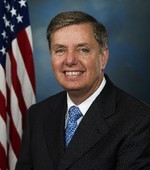 Wikimedia
Wikimedia Lindsey Graham
Who is he? A senator from South Carolina, he’s John McCain’s closest ally in the small caucus of Republicans who are moderate on many issues but very hawkish on foreign policy.
Is he running? He sure is. Graham kicked off the campaign June 1.
Who wants him to run? John McCain, naturally. Senator Kelly Ayotte, possibly. Joe Lieberman, maybe?
Can he win the nomination? Not really. The South Carolina senator seems to be running in large part to make sure there’s a credible, hawkish voice in the primary. It seems like Graham started his campaign almost as a lark but has started to enjoy the ride, plus he’s shown he’s a great performer on the stump. Molly Ball explores his chances at greater length here.
What else do we know? Graham promises to have a rotating first lady if he wins. We nominate Lana del Ray.
 Michael Vadon
Michael Vadon George Pataki
Who is he? Pataki ousted incumbent Mario Cuomo in 1994 and served three terms as governor of New York.
Is he running? Yes. He announced May 28.
Who wants him to run? It's not clear. Establishment Northeastern Republicans once held significant sway over the party, but those days have long since passed.
Can he win the nomination? No. As my colleague Russell Berman previously noted, Pataki is one of the longest of the long-shot GOP candidates. He has touted his leadership on 9/11, when he served as governor, but so did former New York City Mayor Rudy Giuliani. He was also a successful conservative governor in a deep-blue Northeastern state, but so was former Massachusetts Governor Mitt Romney. He seems be socially liberal enough to alienate primary voters, but not enough to capture Democrats.
Does his website have a good 404 page? No.
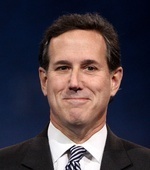 Gage Skidmore
Gage Skidmore Rick Santorum
Who is he? Santorum represented Pennsylvania in the Senate from 1995 until his defeat in 2006. He was the runner-up for the GOP nomination in 2012.
Is he running? Yes, with a formal announcement on May 27.
Who wants him to run? Social conservatives. The former Pennsylvania senator didn't have an obvious constituency in 2012, yet he still went a long way, and Foster Friess, who bankrolled much of Santorum's campaign then, is ready for another round.
Can he win the nomination? It's tough to imagine. Santorum himself said his chances would hinge on avoiding saying "crazy stuff that doesn't have anything to do with anything." For now, his poll numbers remain in the basement.
Does his website have a good 404 page? No.
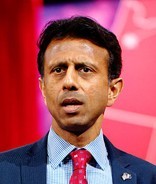 Gage Skidmore
Gage Skidmore Bobby Jindal
Who is he? A former Rhodes Scholar, he’s the outgoing governor of Louisiana. He previously served in the U.S. House.
Is he running? Probably. He announced on May 18 that he is forming an exploratory committee, with a final decision to come after Louisiana’s legislative session ends on June 11.
Who wants him to run? It’s hard to say. Jindal has assiduously courted conservative Christians, both with a powerful conversion story (he was raised Hindu but converted to Catholicism in high school) and policies (after other governors reversed course, he charged forward with a religious-freedom law). But he still trails other social conservatives like Ted Cruz and Mike Huckabee.
Can he win the nomination? Probably not. Jindal still lacks traction at the national level, he faces an overcrowded field of social conservatives, and his stewardship of the state of Louisiana has come in for harsh criticism even from staunch fiscal conservatives. It’s hard to see how he gains momentum from here.
When will he announce? June 24.
What else do we know? In 1994, he wrote an article called “Physical Dimensions of Spiritual Warfare,” in which he described a friend’s apparent exorcism.
 Gage Skidmore
Gage Skidmore Mike Huckabee
Who is he? An ordained preacher, former governor of Arkansas, and Fox News host, he ran a strong campaign in 2008, finishing third, but sat out 2012.
Is he running? Yes. He kicked off the campaign May 5.
Who wants him to run? Social conservatives; evangelical Christians.
Can he win the nomination? Huckabee's struggle will be to prove that he's still relevant. Since he last ran in 2008, a new breed of social conservatives has come in, and he'll have to compete with candidates like Ted Cruz. His brand of moral crusading feels a bit out of date in an era of widespread gay marriage—not least when curiously chose to attack Beyoncé. (His statements in support of Josh Duggar have also earned him criticism and quizzical reaction.) He faces fire from strict anti-tax conservative groups for tax hikes while he was governor. And fundraising has always been his weak suit. But Huckabee's combination of affable demeanor and strong conservatism resonates with voters.
Does his website have a good 404 page? It’s pretty good.
 Gage Skidmore
Gage Skidmore Ben Carson
Who is he? A celebrated former head of pediatric neurosurgery at Johns Hopkins, Carson became a conservative folk hero after a broadside against Obamacare at the 2013 National Prayer Breakfast.
Is he running? Yes, after a May 4 announcement.
Who wants him to run? Grassroots conservatives, who have boosted him up near the top of polls, even as Republican insiders cringe. Carson has an incredibly appealing personal story—a voyage from poverty to pathbreaking neurosurgery—and none of the taint of politics.
Can he win the nomination? Almost certainly not. Carson's politics are conservative on some issues, but so eclectic as to be nearly incoherent overall. He's never run a political campaign, and has a tendency to do things like compare ISIS to the Founding Fathers. Despite initially building a formidable organization, he’s struggled to keep it together, with a rash of top staffers defecting.
Does his website have a good 404 page? No.
 Gage Skidmore
Gage Skidmore Carly Fiorina
Who is she? Fiorina rose through the ranks to become CEO of Hewlett-Packard from 1999 to 2005, before being ousted in an acrimonious struggle. She advised John McCain’s 2008 presidential campaign and unsuccessfully challenged Senator Barbara Boxer of California in 2010.
Is she running? Yes, as of a May 4 announcement.
Who wants her to run? It isn’t clear what Fiorina’s constituency is. She’s a former CEO of Hewlett-Packard, but there are other business-friendly candidates in the race, all of whom have more electoral experience.
Can she win the nomination? Almost certainly not. Fiorina’s only previously political experience was a failed Senate campaign against Barbara Boxer in 2010. She has mostly been serving the role of harasser in the race so far, stirring up the news with slams on environmentalists for causing droughts (your guess is as good as mine), Obama for backing net neutrality, and Apple’s Tim Cook for speaking out on Indiana’s Religious Freedom Restoration Act. Mainly, though, she has strongly criticized Hillary Clinton, and some Republican strategists like the optics of having a woman to criticize Clinton so as to sidestep charges of sexism. Fiorina seems to be wowing voters in Iowa, but that hasn’t translated into national support—yet.
What else do we know? Fiorina's 2010 Senate race produced two of the most entertaining and wacky political ads ever, "Demon Sheep" and the nearly eight-minute epic commonly known as "The Boxer Blimp."
Does her website have a good 404 page? No.
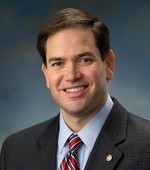 Wikimedia
Wikimedia Marco Rubio
Who is he? A second-generation Cuban-American and former speaker of the Florida House, Rubio was catapulted to national fame in the 2010 Senate election, after he unexpected upset Governor Charlie Crist to win the GOP nomination.
Is he running? Yes—he announced on April 13.
Who wants him to run? Rubio enjoys establishment support, and has sought to position himself as the candidate of an interventionist foreign policy.
Could he win the nomination? Charles Krauthammer pegs him as the Republican frontrunner. His best hope seems to be to emerge as a consensus candidate who can appeal to social conservatives and hawks, and he's even sounded some libertarian notes of late. He's well-liked by Republicans, and has surged forward since announcing, but he needs to move up from second choice to first choice for more of them. Rubio seems to scare Democrats more than any other candidate, too.
Does his website have a good 404 page? It’s decent.
 Wikimedia
Wikimedia Rand Paul
Who is he? An ophthalmologist and son of libertarian icon Ron Paul, he rode the 2010 Republican wave to the Senate, representing Kentucky.
Is he running? Yes, as of April 7.
Who wants him to run? Ron Paul fans; Tea Partiers; libertarians; civil libertarians; non-interventionist Republicans.
Can he win the nomination? That depends who you ask. The Kentucky senator would be an unorthodox pick, with many positions outside his party's mainstream. He's relatively permissive on drugs, passionate about civil liberties, and adamantly for restraint on foreign policy. But Paul has worked hard to firm up establishment ties since reaching the Senate, and he has recently worked to paper over his differences with GOP’s hawkish wing, calling for a declaration of war against ISIS and generally saber-rattling. He is positioning himself as a candidate with crossover appeal in the general election, and his announcement email mocked the idea that only an establishment candidate can win a general election.
What else do we know? One of Paul's greatest strengths is the base bequeathed to him by his father, three-time presidential candidate and former Representative Ron Paul. But as The Washington Post has reported, his father is also Senator Paul's biggest headache.
Does his website have a good 404 page? No.
 Wikimedia
Wikimedia Ted Cruz
Who is he? Cruz served as deputy assistant attorney general in the George W. Bush administration and was appointed Texas solicitor general in 2003. In 2012, he ran an insurgent campaign to beat a heavily favored establishment Republican for Senate.
Is he running? Yes. He launched his campaign March 23 at Liberty University in Virginia.
Who wants him to run? Hardcore conservatives; Tea Partiers who worry that Rand Paul is too dovish on foreign policy; social conservatives.
Can he win the nomination? Though his announcement gave Cruz both a monetary and visibility boost, he still starts with some serious weaknesses. Much of Cruz's appeal to his supporters—his outspoken stances and his willingness to thumb his nose at his own party—also imperil him in a primary or general election, and he's sometimes been is own worst enemy when it comes to strategy. But Cruz is familiar with running and winning as an underdog.
Does his website have a good 404 page? No.
 Gage Skidmore
Gage Skidmore Jeb Bush
Who is he? The brother and son of presidents, he served two terms as governor of Florida, from 1999 to 2007.
Is he running? Everyone knows he is, but it’s not official yet.
Who wants him to run? Establishment Republicans; George W. Bush; major Wall Street donors.
Can he win the nomination? No one really knows. Since jumping into the race, he has continued to poll well and raise lots of money. He seems like a lock to rack up all-important endorsements from top Republicans. But predictions that he would quickly come to dominate the field have not come to pass, and while many analysts predicted that his moderate record would cause trouble in Iowa and with grassroots activists, that problem seems to be deeper than expected. His poll numbers are probably helped by his name, which is a double-edged sword.
When will he announce? On June 15.
What else do we know? Since Bush's surprise announcement, he has tended to stay fairly quiet, delivering some big speeches and hitting fundraisers, but not making a great number of trips to Iowa or New Hampshire.
Does his website have a good 404 page? No.
 David Shankbone
David Shankbone Chris Christie
Who is he? What’s it to you, buddy? The combative New Jerseyan is in his second term as governor and previously served as a U.S. attorney.
Is he running? It seems ever harder to imagine. With indictments of two of his former top aides in early May, and a guilty plea by a high-school friend and political appointee, the George Washington Bridge scandal has crept ever closer to him. The New York Times says he's trying to "salvage" his campaign. Christie does have some campaign infrastructure in place in New Hampshire, which is close to his home state, with staffer hires and town-hall meetings there. He has also formed a political-action committee.
Who wants him to run? Moderate and establishment Republicans who don't like Bush or Romney; big businessmen, led by Home Depot founder Ken Langone.
Can he win the nomination? The tide of punditry had turned against Christie even before the "Bridgegate" indictments. It's hard to imagine how he recovers at this point, given the crowded field and the fact that Jeb Bush seems to dominate the moderate end of the Republican Party. Citing his horrific favorability nominations, FiveThirtyEight bluntly puns that "Christie's access lanes to the GOP nomination are closed." A recent Monmouth University poll showed him trailing even Donald Trump (see below) for the nomination. Plus, he'd probably have to resign as governor to run, because of SEC rules that cover donations from companies that do business with the state. With such high stakes, he might not want to run at all if he doesn't see a clear path to win.
When will he announce? According to Time, Christie has told donors that running is harder than he had realized, and that he may have to push back an announcement to as late as June.
What else do we know? If you can tell what is going on in this GIF, please let me know. Is he tossing the jacket away? Or catching it? And what does it mean?
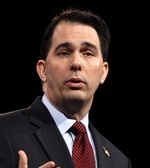 Gage Skidmore
Gage Skidmore Scott Walker
Who is he? Elected governor of Wisconsin in 2010, Walker earned conservative love and liberal hate for his anti-union policies. In 2013, he defeated a recall effort, and he won reelection the following year.
Is he running? Almost certainly.
Who wants him to run? Walker's record as governor of Wisconsin excites many Republicans. He's got a solid résumé as a small-government conservative. His social-conservative credentials are also strong, but without the culture-warrior baggage that sometimes brings. And Walker has won three difficult elections in a blue-ish state.
Can he win the nomination? No one knows. For all his strengths, Walker has never run a national campaign and isn't exactly Mr. Personality. But Jeb Bush's emergence seems to have helped Walker, propelling him to the front of the pack as a more conservative alternative to Bush. He's now solidly in the top tier of candidates.
When will he announce? June.
What else do we know? Barack Obama took a shot on April 7 at Walker for his criticism of a nuclear-deal framework with Iran. That's a sign that he's becoming a power player, and sniping from the White House is only likely to elevate Walker's standing with Republicans. Good news, bad news: Walker has a geographic advantage in his proximity to Iowa, but a potential biological disadvantage from his allergy to dogs.
 Gage Skidmore
Gage Skidmore Sarah Palin
Who is she? If you have to ask now, you must not have been around in 2008. That’s when John McCain selected the then-unknown Alaska governor as his running mate. After the ticket lost, she resigned her term early and became a television personality.
Is she running? A bizarre speech in January made a compelling case both ways.
Who wants her to run? Palin still has diehard grassroots fans, but there are fewer than ever.
Can she win the nomination? No.
When will she announce? It doesn't matter.
 Gage Skidmore
Gage Skidmore Mitt Romney
Who is he? The Republican nominee in 2012 was also governor of Massachusetts and a successful businessman.
Is he running? Nah. He announced in late January that he would step aside.
Who wanted him to run? Former staffers; prominent Mormons; Hillary Clinton's team. Romney polled well, but it's hard to tell what his base would have been. Republican voters weren't exactly ecstatic about him in 2012, and that was before he ran a listless, unsuccessful campaign. Party leaders and past donors were skeptical at best of a third try.
Could he have won the nomination? He proved the answer was yes, but it didn't seem likely to happen again.
 Gage Skidmore John Bolton
Gage Skidmore John Bolton Who is he? A strident critic of the UN and leading hawk, he was George W. Bush’s ambassador to the UN for 17 months.
Is he running? Nope. After announcing his announcement, in the style of the big-time candidates, he posted on Facebook that he wasn’t running.
Who wanted him to run? Even among super-hawks, he didn’t seem to be a popular pick, likely because he had no political experience.
Could he have won the nomination? They say anything is possible in politics, but this would test the rule. A likelier outcome could be a plum foreign-policy role in a hawkish GOP presidency.
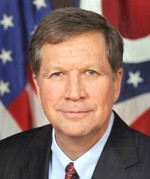 Wikimedia
Wikimedia John Kasich
Who is he? The current Ohio governor ran once before, in 2000, after a stint as Republican budget guru in the House. Between then and his election in 2010, he worked at Lehman Brothers. Molly Ball wrote the definitive profile in April.
Is he running? Almost certainly. He has visited early states, laid out ideas, and established a PAC.
Who wants him to run? Kasich’s pitch: He’s got better fiscal-conservative bona fides than any other candidate in the race, he’s proven he can win blue-collar voters, and he’s won twice in a crucial swing state. While his polling isn’t stellar, he still leads Graham, Fiorina, and Jindal.
Can he win the nomination? As Ball noted, Kasich seems in some ways perfectly suited to this race; in other ways, his insistent anti-charisma makes it hard to imagine him winning, and his attitude is amusingly blasé: “If they like it, great. If they don’t like it, I’ll play more golf.” He could be hurt by his embrace of Medicaid expansion under Obamacare, a move he had to circumvent the Republican-led General Assembly to make.
When will he announce? After June 30.
What else do we know? He doesn’t own a smartphone, and seldom uses a computer. Maybe he can be friends with Lindsey Graham—the old way, via U.S. Mail.
 Gage Skidmorety
Gage Skidmorety Donald Trump
Who is he? The real-estate developer and reality-TV star almost certainly isn’t worth as much as he wants you to think he is.
Is he running? Like, for real? Of course not.
Who wants him to run? Jon Stewart; Donald Trump.
Can he win the nomination?

When will he announce? June 16
What else do we know? I’m deeply ashamed and upset that I had to fill out this entry.
Others Still in the Mix:
Bob Ehrlich, Peter King, Harold Stassen, Jim Gilmore









Burma Doesn't Want the Rohingya but Insists on Keeping Them

What happens when the government systematically isolates an ethnic minority, denies its members citizenship rights, sends them to refugee camps, looks away as a campaign of ethnic violence targets them, and ultimately promises to drive them out of the country?
It’s not a tough question: The members of that minority start looking for a way, any way, to leave. Even if that means paying human traffickers to smuggle them on rickety death traps of boats at extortionate prices to places that don’t want them, they’ll look for a way to go.
Now, what happens if the same government says they also can’t leave?
Related Story
Ransoms and Reunions: The Internet Huts of Burma
The world will find out soon enough, though it’s hard to imagine the answer will be easy to stomach. According to The New York Times, the government of Burma says it will prevent members of the country’s beleaguered Rohingya Muslim population from leaving. The junta that rules the country is responding to fierce international pressure applied over the last few weeks. Thousands of Rohingya were marooned at sea, onboard overcrowded vessels, often without food or water, but without any place to go either, since neighboring countries were unwilling to take them in. Those countries are essentially pleading poverty—who will pay for the refugees? And if those countries let a few in, what will stop a mass exodus landing on their shores?
What’s happening now seems like a lesson in the law of unintended effects of international pressure. Burma’s leaders, who are slowly moving into the embrace of the international community, have relented on the most immediate question, but aren’t doing anything to address the deeper problem:
[T]he government insists that most of the migrants do not belong in Myanmar, referring to them as Bengalis, and says it has no plans to alter policies that strip them of basic rights and confine more than 140,000 to a crowded, squalid government camp here.
“There is no change in the government’s policy toward the Bengalis,” U Zaw Htay, a deputy director general of the Myanmar president’s office, said in an interview this week.
The government posture is decidedly ahistorical. Muslims, and particular Rohingya, have been in present-day Burma for quite some time. Though they are originally of Bengali descent, the present-day populations in Burma date back at least a century, and perhaps much longer. But in order to qualify for even a second-class citizenship, they must prove family residency for at least 60 years. In the impoverished region they call home, paperwork is often impossible to come by. Others have lived in Burma their entire lives, but still don’t have 60 years to go on. Meanwhile, they’ve been barred from voting and prevented from entering professions like law and medicine. Yet none of their neighbors, including Bangladesh, want to take the Rohingya in, either.
There have been warnings of coming ethnic violence in Burma for almost a decade. In 2013, a bizarre, numerology-driven campaign by radical Buddhist monks began a wave of violence against Muslims. Many fled their homes, and now there are an estimated 140,000 living in ramshackle, temporary huts. They’re dependent on international aid, though not all are eligible for it, and desperately in need of medicine. And the Burmese government won’t let them leave the camps or their environs. What is happening is at the very least apartheid, and some observers—including the U.S. Holocaust Memorial Museum—have warned it could tip into genocide.
Who will pressure the Burmese government, though? The U.S., pleased by the junta’s opening up, has mostly stayed out of it. The international community seems more concerned for the moment about the refugees in boats than the ones suffering on shore, a situation that has resulted in today’s can’t-leave-and-can’t-stay dilemma. And Burma’s domestic opposition seems to have precisely no interest in standing up for the Rohingya.
In particular, it’s been disconcerting to see Aung San Suu Kyi, a leader known as a model of political courage and moral probity, resolutely refusing to get involved. The Nobel Peace Prize winner has disappointed many people who viewed her as a hero for human rights. Apparently unwilling to take up a cause that’s unpopular with most Burmese, she won’t even say the word “Rohingya.” She has been unmoved by a plea from the Dalai Lama to speak up.
The fact that even Suu Kyi won’t defend them spotlights the isolation of the Rohingya—an isolation that will only increase now, as detention camps intended as a prelude to deportation are becoming more permanent prisons. In May, as refugees tried to reach Malaysia, the Malaysian deputy home minister insisted Rohingya stay away: “I would like them to be turned back and ask them to go back to their own country.” The problem is that the Rohingya have no country.









A Big Win for Big Labor
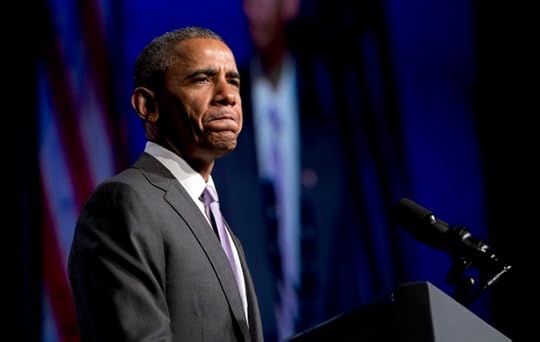
Updated June 12, 2015, 2:40 p.m.
House Democrats may have cast the fatal votes that killed President Obama’s trade agenda on Friday morning, but the party responsible for its demise was a coalition whose numbers have diminished for decades and whose political clout has been questioned: the American labor movement.
The Obama administration believed it had the votes necessary to pass the most-contentious piece of its trade legislation—Trade Promotion Authority—that would allow the president to finalize agreements with Pacific Rim nations and the European Union. But the labor movement was not prepared to give up. Instead, it caught the administration off guard by launching a surprise attack on legislation known as Trade Adjustment Assistance, a program designed to help workers displaced by trade and one which Democrats—and organized labor—have overwhelmingly supported in the past. Just 40 House Democrats—less than one-quarter of the caucus—voted for the bill, which fell in a landslide, 302-126. By defeating the aid measure, the labor movement rendered the administration’s careful work rounding up votes for Trade Promotion Authority largely irrelevant.
As the margin of the defeat became clear, some Democrats scrambled to change their votes to 'No,' a measure of just how unpopular the measure had become. Republicans moved quickly to hold a vote on Trade Promotion Authority, but even though the bill received a majority of votes, it will not go to the president's desk because it does not match the Senate-passed package. GOP leaders could try to bring the assistance bill back for another vote next week, and the White House tried to downplay Friday’s loss as a momentary stumble. Press Secretary Josh Earnest referred to it as a “procedural snafu”—the same phrase he used to describe the trade package’s initial failure in the Senate earlier this spring. “It’s deja vu all over again,” Earnest said. Yet while the Senate had first fallen short by only a few votes, Obama would have to flip dozens of House Democrats to get it passed.
Trade Promotion Authority and Trade Adjustment Assistance—TPA and TAA in Beltway acronym-speak—have always been a package deal in Congress. Republicans support TPA because it leads to new trade agreements, while Democrats accept TAA as a consolation prize, because it mitigates the effect of outsourcing. (Although there are questions about how effective that assistance really is.) Yet once it became clear that Obama had secured enough Democratic votes to join most Republicans in passing TPA, the AFL-CIO took the astonishing step of announcing it would urge its progressive allies to oppose TAA as well. Because Republicans typically oppose the assistance piece of the trade package, the loss of Democratic support doomed the bill, and with it, the entire trade measure.
Democrats revolted even after their leader, Nancy Pelosi, negotiated a last-minute change to the proposals removing cuts to Medicare that would have paid for the assistance portion. And they rejected the most aggressive personal lobbying campaign that Obama has undertaken since the passage of his healthcare law five years ago. The White House has been wooing Democrats for weeks, even dangling the trappings of the presidency—Oval Office visits, rides on Air Force One, phone calls galore—in a way that’s been rare for Obama. (The D.C. pundit class has long urged him to engage in this sort of maneuvering to advance his legislative agenda; it doesn’t seem to have made much difference.) On Thursday evening, Obama made a surprise visit to the Congressional Baseball Game, where he smiled for pictures with lawmakers and reportedly button-holed Pelosi for 15 minutes on the trade bill. By Friday morning, he was back on Capitol Hill for a last-minute meeting with House Democrats just hours before the vote.
Democrats rejected the most aggressive personal lobbying campaign that Obama has undertaken since the passage of his healthcare law five years ago.While Obama was glad-handing, administration officials were making a harder sell to progressives on the trade assistance bill. In language he usually reserves for denouncing the Tea Party, Earnest warned that Democrats who opposed TAA would not merely be voting against trade legislation but would be “signing the death certificate” for a crucial and longstanding aid program that expires at the end of the year. And in another sign of the party’s internal tumult, a senior House Democratic aide later told reporters that Representative Cedric Richmond, a Louisiana Democrat, had criticized strong-arm union tactics and AFL-CIO President Richard Trumka in a private party meeting, in an apparent effort to embarrass unions into backing down.
None of it worked.
At the AFL-CIO’s behest—and led by liberals including Rosa DeLauro, Keith Ellison, and Sandy Levin—Democrats defeated a bill they liked (TAA) to kill a bill they hated (TPA). Borrowing a page from the recent playbook of conservatives, Trumka and his allies threatened to launch primary challenges against Democrats who voted with the president. Obama responded by promising to campaign for Democrats who took the tough votes and stood by him. In the end, the fears of a union-backed challenge trumped the carrot of electoral help from a lame-duck president. “The difference between a liberal Democrat and a cannibal, according to LBJ, was cannibals don’t eat their own,” Henry Cuellar, a pro-trade Democrat from Texas, remarked a day before the vote, the Huffington Post reported.
The final indignity for Obama came in the minutes before the vote, when Pelosi—his erstwhile ally for six-and-and-half years—deserted him as well. The minority leader had remained publicly neutral for months while helping the White House behind the scenes. But in a floor speech announcing her position, Pelosi said she would do what Obama just hours before had explicitly asked his party not to do: Vote against TAA to tank TPA. Pelosi said she had always wanted to find “a path to yes,” and she voiced hope that by defeating Trade Promotion Authority now, Democrats could force Obama and Republicans to improve the package and try again. “That doesn’t mean I don’t think that the road can be repaired—just that it must be lengthened,” Pelosi said. “We need to slow this fast track down.” After the difficulty trade proponents had just to get the package through the Senate, however, it’s unclear if a do-over will be possible.
Labor’s opposition campaign even reached Republicans at the end, Speaker John Boehner acknowledged to reporters. After the union has locked down most of the Democrats,” the speaker lamented on Thursday, “they've turned their fire on conservative Republican households and shoving mail into these districts, raising other concerns from the right.”
For the labor movement, the pitched battle with Obama over trade marked the final destruction of an uneasy alliance. Despite their agreement on most of the president’s agenda, union leaders have been frustrated with the White House several times over the years. When Obama swept into office with Democratic majorities in 2009, the administration never pushed aggressively for the Employee Free Choice Act, a top labor priority. In the healthcare debate, unions prized the public option and swallowed hard when the administration—along with Democratic leaders in Congress—jettisoned it to push the bill to passage. Along with progressives, union leaders opposed Obama’s negotiations with Republicans for a grand bargain on the deficit, but then they joined Republicans in pushing for approval of the Keystone XL pipeline over the objections of environmentalists.
Yet none of those skirmishes compared to the all-out war unions fought in opposing Obama on trade. On this issue, the president could not blame his favorite foil for the defeat of his agenda. Led by Boehner and Paul Ryan, Republicans delivered their share of the votes for the trade bills, including more than twice their usual amount for Trade Adjustment Assistance. The president was brought down by Democrats, and by the political muscle of a movement that many had left for dead.









Jagged Little Pill at 20: A Roundtable

On June 13, 1995, the Canadian singer-songwriter Alanis Morissette released Jagged Little Pill, an alt-rock landmark of a record that, despite modest expectations, ended up selling more than 30 million copies and winning four Grammy Awards. But beyond its commercial success, the album ended up having a profound impact on music, both in the second half of the ‘90s and beyond, as well as entering the canon of music that defines a generation. To mark the record’s 20th anniversary, Sophie Gilbert, Spencer Kornhaber, and Megan Garber discuss what it meant to them then, and how it sounds two decades later.
Gilbert: When I think about Jagged Little Pill, I mostly flash back to a history trip I took in junior high to visit the French battlefields of World War One (stay with me here). Imagine 50 13-year-olds all screaming along to “You Oughta Know,” but then abruptly stopping any time it got to a vaguely sexual part, thanks to the fact that the trip was chaperoned by our youngish drama teacher, Mr. Graham (hi, Mr. Graham) and we were all too embarrassed to vocalize things like, “AND ARE YOU THINKING OF ME WHEN YOU FUCK HER” in front of him.
Related Story
The release of Jagged Little Pill on June 13, 1995, happened to coincide with the beginning of my teenage angst, as did that very inappropriate singsong right by the location of the Battle of the Somme. But it’s amazing listening to it 20 years later, because unlike so much of the music from that time, it isn’t dated. It doesn’t have the affectedness of Britpop or the brittle plasticity of ‘90s R&B. Instead, it tapped into a kind of poetic female rage that I don’t think anyone has vocalized quite as well since. Its lyrics practically beg to be quoted in ALL CAPS. Even Alanis herself acknowledged the record’s potency as a kind of female call to arms in the video for “Ironic,” which features a bunch of Alanis clones screaming along to the lyrics on a road trip and grinning at each other. (At the end it appears there’s only been one Alanis all along, so maybe it’s all about multiple personality disorder and I’ve been misinterpreting it all this time, but never mind.)
It’s hard to think of another female artist who’s made a rock album like this one, let alone a record that’s so angry, so unabashedly sexual (“Every time I scratch my nails down someone else’s back I hope you feel it”), and so inventive.
Kornhaber: I bet a lot of people have a Mr. Graham-like moment buried in the memory banks somewhere with regards to this album. Jagged Little Pill was the kind of culture-conquering CD that was in every Ford Windstar, poppy and straightforward enough to seem sonically appropriate for family road trips. I don’t really think I knew what Alanis was screaming about doing in that theee-at-urrr with her ex. I just knew it was a lot more fun to listen to than the Bob Marley best-of compilation that my mom and dad otherwise had in rotation (sorry, Bob).
It was fun, first and foremost, because of that voice, that phrasing. I have a hard time of coming up with mainstream singers who have as much character and verve and comfort with sounding totally ugly as she does (Fiona Apple carries the torch but can barely be called mainstream these days). Apologies both to the rock-and-roll credibility committee and to the gods of overused comparisons, but the precedent that might most be apt is Joni Mitchell; not in the way she sounds but in the thing she does, crafting phrases upon phrases that tumble out in totally original and yet conversation-aping ways. Throughout the album, she sounds totally unfiltered, even though making something as effective as JLP takes high-level creative vision. This wasn’t self-indulgent confession for the sake of it; Alanis wrote anthems, straight bangers, with the hooks ready to be wailed at arenas or, yes, car rides.
I have a hard time coming up with mainstream singers who have as much comfort sounding totally ugly.It’s easy to see her as a part of the grunge flood, and her angst is indeed very of its time—who other than Eminem and the dudes of mall-metal have had a hit album as angry as this since then? But when I listened to it recently, I was surprised and kind of thrilled to find it wasn’t the deliciously one-note blast of aggression that my memory had slotted it as. Alanis is, like, living! She is an idealist! Kurt Cobain saw life as a sick joke because nothing mattered; she saw it as a sick joke because everything does. That’s what “Ironic” is about (also hush up, the song is in fact ironic)—“Life has a funny way of sneaking up on you,” she mutters at the end, which explains all that laughing in the possibly schizo video you described, Sophie.
Gilbert: It’s weird what you said about Alanis writing straight-up bangers, Spencer, because JLP wasn’t supposed to be a hit. It was Alanis’s third album, after two Janet Jackson-esque pop records she released as a teenager, and it seems like more than anything it was intended to dramatically shake up her reputation as an artist so that whatever came next could be appreciated on its own terms. But even with all that, you’re so right how self-aware it is in its singalonginess, and its arena-rocking potential. In tumbling down the Alanis rabbit hole this morning I watched the video for “Hands Clean,” which has a similar awareness of its future place in the canon—you see a group of girls singing it awkwardly at karaoke while the lyrics scroll over the screen.
But the other thing I love about the record is its tonal schizophrenia: It jumps from the fury of “You Oughta Know” to the almost lullaby-like first line of “Perfect.” That song is so brilliant in its juxtaposition of soft guitar chords and Alanis’s quiet, gentle voice with the lyrics, which are Dance Moms brutal: “If you’re flawless / Then you’ll win my love / Don’t forget to win first place / Don’t forget to keep that smile on your face.” Then her voice gets harsher, and the rest of the band jumps in. “I’ll live through you / I’ll make you what I never was / If you’re the best then maybe so am I / Compared to him / Compared to her.”
She’s already skewered pretentious boyfriends, abusive guardians (“Slap me with a splintered ruler”), feckless lovers, and pushy parents, and we’re only three songs in.
Kornhaber: The word “schizophrenia” and hints of craziness have come up a few times in this discussion and that’s totally fair; you have to be a little unhinged, at least temporarily, to want to voodoo-torment someone by scratching one’s nails down another’s back. But what’s remarkable is how lucid, precise, and totally logical she is even when she’s at her most volcanic. I mean, listen to how in-control she is on the opener “All I Really Want,” asking why you’re so afraid of silence, stopping the song—Beyonce replicated this trick on “Feeling Myself” last year—and then hitting you with the neurotic’s questionnaire: “Did you think about your bills, your ex, your deadlines? / Or when you think you're gonna die? / Or did you long for the next distraction?” The answer, Alanis, is yes! I did think of those things! All ye who would condemn Millennials as using technology to tune out the world, listen to Alanis; in 1995, she nailed the reason why people distract themselves, which maybe means it’s less generational than eternal.
I also love that song in particular for introducing listeners to that Alanis-y blend of existential crisis and matter-of-fact chit-chat. “All I really want is some peace, man,” she says, and the rest of the record follows up with a lot of other semi-mocking, semi-loving repurposings of the way people actually talk. “I hate to bug you in the middle of dinner …” “Yeah, I really do think.” The duality of the language, the roars next to the small talk, is just so fitting for what she’s singing about. I guess I’m trying to explain something that she explained perfectly herself on the thesis statement of the album, “One Hand In My Pocket.” High/grounded, sane/overwhelmed—“what it all boils down to is that no one’s really got it figured out just yet”
Garber: Totally—I love that duality not just because it helps make the album so musically and lyrically interesting, but also because it gives JLP the feeling of being, in ways tiny and huge, just … true. I sadly don’t have a specific Mr. Grahamian memory of the album (save for the fact that, at a certain point in my life, I was a fan of “Full House”); what I do remember, though, is how in a weird way I looked up to it, and to Alanis herself. The album was—just like Alanis, just like many of us—simultaneously sane and overwhelmed. It had this sense of life as this full and rich and fragile and occasionally infuriating thing, this thing that happens both with your help and spite of it. The songs, taken together, take for granted the basic idea that anger and frustration are part of life, and that sometimes, yes, you may find yourself sneering, to an ex who has disappointed you, "I'm sure she'd make a really excellent mother.” But they also, however, assume that the frustration will pass, that things will get better. And that they’ll get better both despite and because of the fact that your ex-boyfriend is kind of a jerk.
[Side note: It is CRAZY that Britney’s “Baby … One More Time” came out just three years after JLP.]
Re-listening today, I’m struck again by how optimistic it is.Re-listening to the album today—and it’s amazing how ageless these songs are, all in all—I’m struck again by how optimistic it is, fundamentally. And also, in its way (despite all the rage and the talk of raaaaaaaainnnnnnn … on your wedding ... DAY), wise. It’s like Alanis is self-consciously playing the role of older sister or cool aunt or whatever—someone who will tell you about life, the weird and awkward and occasionally terrible stuff that no one else will tell you about, without talking down to you or sugar-coating things. It’s cliche, today, to assume that female pop stars are role models by default, particularly to young girls; Alanis, or at least the character she plays on JLP, really seemed to see herself that way, though—and to take advantage of it. Some other lyrics that practically beg to be quoted in ALL CAPS are the ones from “You Learn,” which would also be at home in a self-help book (an angsty and poetic one, but still): I RECOMMEND BITING OFF MORE THAN YOU CAN CHEW TO ANYONE (I CERTAINLY DO) / I RECOMMEND STICKING YOUR FOOT IN YOUR MOUTH AT ANY TIME (FEEL FREE).
She adds, “Throw it down (the caution blocks you from the wind) / Hold it up (to the rays).” Which all has a whiff of graduation speech to it (or, more musically, of Baz Luhrmann’s “Everybody’s Free to Wear Sunscreen”): It is straight-up, earnest advice. Especially when we hit the refrain:
You live, you learn
You love, you learn
You cry, you learn
You lose, you learn
You bleed, you learn
You scream, you learn
Gilbert: I totally agree, Megan. Alanis had that awkward older sister thing going on where you wanted to suffer right alongside her. And I’m so happy you mentioned Britney, because it reminds me that Britney has covered “You Oughta Know,” and that Alanis herself covered the Black Eyed Peas’ “My Humps.”
This is why it’s so weird to think about the fact that she was only 21 when the album came out, and yet so poised, and so worldly, and so adamant that everyone else could just GTFO. She’s also just a terrific lyricist. Her verbosity can get a wee bit grating in later records (especially the primer of SAT words that is “Thank U,” and the twee wordplay of Under Rug Swept, but on JLP it’s hard to resist, even though eight billion vocabulary pedants have pointed out her questionable definition of “ironic” over the years. In addition to all the human, conversational stuff you mentioned, Spencer, she writes lyrics like, “You see me as a sweet backloaded puppet / And you’ve got meal ticket taste,” and, “I’m like Estella / I like to reel it in and then spit it out / I’m frustrated by your apathy.” She’s as much of a storyteller on the record as she is a performer, which is why that sense of identifying with her angst that you talked about, Megan, is so sharp.
Garber: And speaking of the storytelling elements … we have mentioned “Ironic”—the video, the Great Grammatical/Literary Device Debate that has swirled around it for decades now—but I think we would be remiss not to return to this gem just one more time. (Yeah, I really do think.) What’s striking to me about the track, in particular, given all the conversation about it that still feels (mostly) fresh and familiar, is how vibrantly the song has endured, and across so many levels of culture. There’s the song itself, and the video, but also the heated argument (it’s totally not ironic) and the heated re-argument (actually, it’s totally ironic) surrounding it. There’s the role it played in the conversation about marriage equality. There are the reaction gifs based on it. There are the parodies of it that double as musical fanfic.
I guess what I’m getting at is that “Ironic” is a song that is also, in its way, a meme. Which is definitely not to say that it was the only song of the era to play that role (hi, everything Weird Al made in the ‘90s!); it is to say, though, that it’s hard to think of other works of the time that have proven so enduring in their reach—across mediums, across platforms, across decades. JLP’s release coincided pretty neatly with the rise of the web—the years that found so many Americans AOLing and CompuServing and otherwise dialing up for first time—and, though the connections obviously aren’t causal, it striking how neatly the album captures the possibilities that the Internet represented for so many people, especially young ones, at the time: connection, creativity, community. The sense that we’re in this thing together. And the sense of optimism that is both complicated and pure. “Life has a funny way of sneaking up on you,” Alanis notes, at the close of “Ironic.” But life also has a funny way, she adds, of helping you out. Helping you … out.









Orange Is the New Black Has Never Felt Freer

It takes a little while, watching the third season of Orange Is the New Black, to figure out how, exactly, the Netflix prison dramedy has changed for 2015. Twelve minutes, to be precise. That’s the amount of time that passes in the premiere before the reappearance of Piper Chapman, the blonde Brooklynite who was once the show’s protagonist but, as is made clear by her order in the season-opening lineup, is now just another member of the ensemble. Bantering about hypothetical best ways to commit suicide, a correctional officer disses her suggested death route—pills—as exactly the kind of richy-rich solution he’d expect from her. “I make 11 cents an hour,” she replies as she helps fashion a cooling fan into a mini-golf windmill for some visiting kids. “When I get out of here, I will have no home, I will have no job, and not a whole lot of prospects.”
The guard has no sympathy. “Welcome to the real world, princess!”
Related Story
The Orange Is the New Black Season 2 Binge Review
It’s a bleak exchange, but no more bleak than the situations that many of Piper’s behind-bars peers have been in from the start of their sentences. The first two seasons of storylines stripped away many of Piper’s support systems—the fiancée, the best friend, any shreds of family sympathy. The result is someone a little more unhinged and altogether more entertaining than the woman who walked into Litchfield, though the show never lets you forget that she’s entitled to certain privileges even as a prisoner because she’s tall, thin, blonde, and well-spoken . Her scenes once felt obligatory by mere dint of the fact that they powered the show’s plot, but now they mainly allow Taylor Schilling to demonstrate her comedic chops. Piper often seems to be purposefully trolling the people around her; when her parents come to visit, she dispatches them with orgasm noises.
The one-time heroine’s demotion to being just another zany part-time player doesn’t come across like a jarring change, because Orange Is the New Black’s appeal has always been its ensemble. The cast is as diverse in personality and sense of humor as it is in body types and skin colors, and Jenji Kohan’s team of writers work at micro scales to create a massive story. I’d forgotten how insanely packed each episode is—how the alphabet isn’t long enough to start labeling A-plots and B-plots and so on, and how each scene is as densely filled with quotable lines and big ideas as Litchfield is with people. As the newly promoted administrator Joe Caputo says to a recent hire, “These are complicated ladies and a complicated place.”
The premiere episode works to underline that fact. Instead of a series of flashbacks for one character, we get peeks into the pasts of multiple Litchfield denizens—guards and inmates alike, some portrayed in childhood and some in adulthood, all in scenes related to motherhood. That’s because the episode revolves around Mother’s Day, and meditates both on how characters were shaped by their parents and how some of them are now shaping kids even from behind bars. It’s the kind of issue-oriented episode that you might fear would be didactic, especially given the show’s tendency towards sentimentality and cliché during backstory segments. But as is also typical for Orange, the episode leavens the sweet with the dark. Aleida Diaz prepares her daughter for childbirth by telling her that having kids will ruin her life—but hey, having a baby is nice too. One inmate retrieves drugs from her kid’s diaper, and partakes of them while neglecting the infant. Sophia offers her less-than-sensitive son dating advice so antifeminist that even he seems ready to write a think piece about it.
Piper’s demotion doesn’t come across as jarring, because Orange Is the New Black’s appeal has always been its ensemble.This is the strength of a show so mosaic-like: By its nature, it couldn’t make a Big Statement about anything even if it wanted to. Instead, it presents the world as one filled with people making different choices that have different effects based on different circumstances. A conscientious new prison counselor and a kindlier, gentler (but ever-more-masturbation-reliant) regime courtesy of Caputo leads into an exploration of correctional management styles. An emerging friendship between Big Boo and Doggett features lively chats about the efficacy of abortion. And as Daya’s pregnancy enters late term, it presents a wrenching dilemma for her, her family, and the father of her child. But none of these plot lines go quite where you expect; often, characters will make impassioned, earnest speeches only to be laughed at for their self-importance. Politics sometimes serves as a scapegoat, as when when Piper lies to her ex-girlfriend Alex about having engineered her return to prison: “It was the system. You got caught in the system.” Orange, more than perhaps ever before, portrays the system as people.
That’s great, so long as the people are as complicated and consistently funny as they have been in the six new episodes I’ve seen. The dialogue and performances feel looser, freer, and surer of themselves than ever. A few characters make heart-breaking and shocking choices, but overwrought dramatic plot lines of the kind that swallowed the show towards the end of the past two seasons have yet to appear. The best scenes might be the simplest ones, in which bored inmates amuse themselves through the immortal fun of wordplay. At one point, there’s an angry dispute over what to call piles of pubic hair. At another, Pennsatucky gets labeled as “Pennsafucky” by a friend. “You know that Pennsatucky’s a nickname?” she shoots back. “So you don’t got to change it. It’s already a name that’s not my name.”
“Yes,” comes the reply. “But there’s always room to riff.”









Hacking and the Future of Warfare

It’s not like government officials didn't see the attack coming. The Office of Personnel Management has faced repeated hacking attempts—including an incident last year when Chinese hackers tried to steal tens of thousands of files about U.S. workers who had applied for top-secret security clearance. But a breach of federal data that was announced last month appears to be significantly worse than the federal government originally let on.
Hackers may have stolen personnel files for as many as 14 million people. That number, much larger than the actual federal workforce, suggests that the hack may have exposed the information about additional categories of individuals, such as family members or government contractors.
It’s also more than three times as many people as original reports suggested, according to The Hill and other outlets, citing officials who claim the attack originated in China.
Officials are still working to figure out whether the theft of data from the Office of Personnel Management may also include sensitive information about contract workers and family members of employees who underwent background checks. And it's not clear whether hackers could use the data they have to identify U.S. spies or other intelligence personnel.
But it is clear that large-scale data theft is a major problem facing the United States. It has happened before and it will happen again.
In 2012, Verizon said that “state-affiliated actors” made up nearly one-fifth of the successful breaches it recorded that year. In 2013, hackers stole data about more than 100,000 people from the Department of Energy's network. Officials in the United State blame China for years-long hacking attempts against the Veteran Affairs Department that began as early as 2010 and compromised more than 20 million people's personal information. And even though the Office of Personnel Management had been hacked before, it appears the agency continued to be astonishingly lax about its own security. From The New York Times:
The agency did not possess an inventory of all the computer servers and devices with access to its networks, and did not require anyone gaining access to information from the outside to use the kind of basic authentication techniques that most Americans use for online banking. It did not regularly scan for vulnerabilities in the system, and found that 11 of the 47 computer systems that were supposed to be certified as safe for use last year were not “operating with a valid authorization.”
Fighting back against hackers at the government level, many experts say, will require agencies to fight back in real-time. “Like banks and technology companies, government agencies must move to a model that assumes hackers will always get in,” Michael A. Riley wrote for Bloomberg last week. “They’ll need to buy cutting-edge technologies that can detect intruders inside networks and eject them quickly, before the data is gone.”
Officials have warned that in addition to ignoring technical vulnerabilities, the United States hasn't been forceful enough about deterring hackers. Several experts say the U.S. needs to be more aggressive about publicly reporting the scope of hacking attempts as well as identifying and punishing those who steal government data. The authors of a 2013 report by the Commission on the Theft of American Intellectual Property argued that laws should be rewritten to give the Department of Homeland Security, the Department of Defense, and law enforcement agencies the authority to use “threat-based deterrence systems that operate at network speed” to fight back against unauthorized intrusions into national security and critical infrastructure networks.
“These conditions cannot be allowed to fester,” the authors of the report wrote. “China has taken aggressive private and public actions that are inflicting major damage to the American economy and national security. Robust and swift action must be taken by the U.S. government.”
Such deterrence systems could mean targeting hackers with some of their own weapons: government-sanctioned malware or ransomware, software that locks down a computer without a user's consent—a tactic that the U.S. government has already explored. As The Intercept reported last year, top-secret files in the trove of documents leaked by whistleblower Edward Snowden revealed the National Security Agency was "dramatically expanding its ability to covertly hack into computers on a mass scale," including infecting millions of computers across the globe with malware.
The concern is that the government will be able to justify its own covert hacking infrastructure by focusing on the threat of data theft from foreign governments—only to then use malware implants as mass surveillance tools against U.S. citizens.
The military, meanwhile, is beginning to explore what operational readiness and a “traditional war-fighting perspective” might look like when it’s adapted for a post-Cold War digital world. “There are more questions than answers,” wrote the authors of a 2013 Air Force Research Institute report about deterrence in the Internet age. “Organizing to fight through cyber attacks not only prepares the United States to operate under duress, but sends a strong deterrence message to potential adversaries.”
What remains to be seen is the extent to which old military models can even be useful in a new environment. The authors of the Air Force report argue that “human nature has not changed, making fear, honor, and interest no less drivers of human action today than they were in the time of Thucydides.” But the players in an emerging global power struggle that will largely take place online are all new, and they’re using tools that the U.S. government still doesn’t seem to understand.









Me and Earl and the Dying Girl: A Quirky, Self-Absorbed Tragedy

The biggest flaw in Me and Earl and the Dying Girl is right there in the title: the first word, specifically. Alfonso Gomez-Rejon’s Sundance-winning coming-of-age drama is rife with meta-textual ambition, featuring a fourth wall-breaking narrator, rapid cuts to stop-motion animation, set design so attentive to detail that it evokes Wes Anderson, and a teen-with-cancer plot that largely manages to skirt cliché. Which makes it all the more frustrating that it filters all of this through the point of view of a bland, self-centered protagonist whose personal growth makes up the narrative arc of the film while simultaneously being the least interesting thing about it.
Related Story
The Fault in Our Stars: A Betrayal
The “me” of Me and Earl and the Dying Girl is Greg (Thomas Mann), a gawky high school senior in Pittsburgh who narrates his story to the audience with irritating self-awareness, essaying a breakdown of his school’s jocks/geeks/stoners sub-cultures as if it isn’t territory that’s been covered in a thousand other films. Greg cultivates his invisibility in the school, proudly an acquaintance to all and an enemy to none, and spends most of his time in a history teacher’s office watching art films with his friend Earl (RJ Cyler), who helps him make silly but thoughtful movie parodies that have names like My Dinner with Andre the Giant or A Sockwork Orange. When his mother (Connie Britton) hears that a classmate of Greg’s has been diagnosed with leukemia, she nudges him into spending time with her, kindling a friendship that Greg's voice-over constantly reminds us is doomed.
Both Earl and the cancer-stricken Rachel (Olivia Cooke) would serve as far more involving protagonists than Greg. Relegated to the sidelines, the young actors deliver rather spellbinding performances, though they’re limited by their dull narrative purpose. Earl is sometimes Greg’s comically blunt sidekick (he’s African American and supposedly from a “bad part of town” that consists of two ramshackle shotgun houses) and at other times a wise sage beyond his years; Rachel has a doomed sort of maturity, watching sadly but empathetically as the people around her struggle with her tragic diagnosis.
In the middle is the annoyingly precocious Greg. His parents are gently encouraging oddballs (his dad, played by Nick Offerman, putters around the house cooking adventurous ethnic foods), he’s blessed with unique artistic talent (the quirky films he makes with Earl are lovingly rendered on screen as earthy gobs of genius by Gomez-Rejon), and he’s innately funny and charming. So, of course, he spends the whole film complaining about what a boring nonentity he is and how detached he feels from everyone, needing the shock of his friend dying of cancer to finally push him into adulthood.
The biggest flaw in Me and Earl and the Dying Girl is right there in the title: the first word, specifically.This is what keeps Me and Earl from ever feeling particularly authentic or weighty. Far soapier teen dramas along similar lines, like last year’s The Fault in Our Stars, might suffer from brutally obvious symbolism and sudden plot twists, but they also value their lead characters as equals. Rachel is lovingly performed by Cooke, but exists mostly to nudge Greg toward his own personal realizations. Screenwriter Jesse Andrews, who adapted his 2012 novel, gives viewers plenty of evidence to recognize George’s big heart and his personal flaws, but doesn't let Greg himself discover them until the end of the film.
Still, this is a drama about a young girl with cancer, and its final act is designed to hit viewers hard. Gomez-Rejon (a longtime second-unit director who made his feature debut last year with The Town That Dreaded Sundown) shows off way too much in the film’s first hour, filling the frame with tons of overtly clever details and busily moving his camera around to no real end. His meticulous compositions have drawn many comparisons to Wes Anderson, but Me and Earl's kinetic filming of perfunctory, high-school hustle and bustle evokes Richard Kelly's work on Donnie Darko (another Sundance favorite, many moons ago), while lacking that film’s supernatural edge. It’s a relief when Gomez-Rejon settles down a little for the film's more somber closing scenes, which help reflect Greg’s growing maturity in the face of Rachel's advancing illness.
Me and Earl and the Dying Girl is both helped and hindered by its status as a Sundance darling—it’s hard to walk into a much-hyped drama about a teenage girl with cancer expecting it to reinvent the wheel. There are only so many ways to tell this story, and despite the self-aware voice-over and multiple films-within-a-film, there’s little to Me and Earl’s plot that hasn’t been seen before, even if it handles its final moments much more deftly than its peers. Greg's personal evolution closes on a powerful note that helps rescue the film from being formulaic; but it’s still a shame that it’s Greg’s story, first and foremost, that the film chooses to tell.









When a Government Declares Memories Classified

“The government,” the Huffington Post’s Nick Baumann wrote on Twitter on Thursday, “is giving former CIA detainees their memories back.”
Baumann was referring to a Huffington Post report that U.S. authorities are relaxing sweeping rules that prohibited prisoners at the Guantanamo Bay facility from publicly telling their stories of CIA detention and interrogation, since disclosing those experiences could reveal the agency’s secret sources and methods for combatting terrorism. The report included these jarring opening lines:
For years, Guantanamo Bay prisoners’ memories of their time in CIA custody have been considered classified state secrets. Abu Zubaydah's lawyers can’t talk publicly about how he lost his left eye. Lawyers for Mustafa al Hawsawi, who can now only sit on a pillow, can’t tell the press or the public about anal feedings that left him with a rectal prolapse. And until recently, Majid Khan's lawyers couldn’t bring up the time he was hung from a pole for two days, naked and hooded, while interrogators threw ice water on him.
But all that is changing, albeit gradually, following the release in December of a Senate Intelligence Committee report detailing extensive abuses in the CIA’s detention and interrogation program during the Bush administration. The revelations thrust many of the intelligence agency’s techniques into the open, prompting the government to rethink its classification rules for detainees remaining at Guantanamo.
“Under the new rules, the torture methods used in CIA prisons are no longer subject to classification, although any information that could reveal the locations where torture took place or the people who helped facilitate it remains secret,” the Huffington Post’s Ryan Reilly and Jessica Schulberg reported on Thursday. Lawyers for detainees must still petition the government to declassify their clients’ memories on a case-by-case basis.
In a first test of the new system last week, Atlantic contributor and Reuters reporter David Rohde aired allegations by Majid Khan—a Guantanamo detainee turned government witness who has confessed to plotting attacks with 9/11 architect Khalid Sheikh Mohammed—that Khan was tortured and sexually abused at a CIA “black site.” Khan’s lawyers had captured his account of the ordeal in 27 pages of notes taken over seven years, which were only cleared for release by the government in May.
It’s the latest heave in a tug of war between the government and civil-liberties advocates over a fundamental question about the limits of secrecy: Can a government classify people’s memories? More specifically: Can the U.S. government deem anything a detainee says secret?
In 2012, U.S. Army Colonel James Pohl, the military judge in the trial of Khalid Sheikh Mohammed, barred testimony or discussion about “the enhanced interrogation techniques that were applied to an accused … including descriptions of the techniques as applied, [and] the duration, frequency, sequencing, and limitations of those techniques,” ruling that “without limitation, observations and experiences of an accused” were classified.
“A person’s own experiences are what make them a person, and the government can never own or control them.”But James Connell, an attorney representing Guantanamo detainee Ammar al-Baluchi, rejected such reasoning in a 2012 motion to declassify prisoners’ accounts. “A person’s own experiences—whether the smell of a rose or the click of a gun near one’s head—are what make them a person, and the government can never own or control them,” he wrote, according to the Huffington Post. Connell added that detainees “were exposed to classified interrogation techniques only in the sense that Hiroshima was exposed to the classified Manhattan Project.” Their classified memories had been imposed on them against their will through a program that President Obama had since banned.
In a separate motion filed around the same time, Connell pursued another line of reasoning: that by preemptively classifying detainees’ statements, the government was violating its own classification procedures. Information relayed by detainees in court or to their lawyers was “born classified” rather than born free and then classified—a standard of “presumptive classification,” Connell argued, that the U.S. government had previously only applied to public discussion of America’s nuclear program:
The most egregious example of the government’s use of overclassification to suppress unclassified but embarrassing information at Guantanamo Bay is the device of “presumptive classification.” Presumptive classification—more mythology than law—attempts to extend traditional classification rules beyond information damaging to national security to all statements made by or information learned from Guantanamo Bay prisoners. Under the regime of presumptive classification, if a prisoner says that he misses his family, this information is “born classified” even though no original classification authority would or could ever classify it. This practice, unchallenged for years, violates every relevant constitutional, presidential, statutory, and regulatory principle of classification.
Under the terms of Executive Order 13526, classification of information is an act: a person, specifically delegated authority, decides that the risks of disclosing a specific piece of information to the public outweigh the democratic imperative for transparency in the operation of government. Only one type of information—Restricted Data about nuclear weapons-—is “born classified.” Every other type of information must go through the classification process, which applies strict criteria, a presumption of non-classification, and mandatory declassification rules, before it becomes classified.
In a 2013 brief challenging the government’s arguments for classifying detainee statements, the American Civil Liberties Union also rejected equating “the government’s ownership of and control over documents to its ownership of or control over human beings or their personal thoughts and experiences of government-imposed torture. In other words, while ‘illegal activities’ might be able to ‘produce classified documents’ … they cannot produce classified memories and experiences of those illegal activities.”
Now, more than six years after Obama signed executive orders to shutter Guantanamo and ban the CIA’s coercive interrogation techniques, those memories are just beginning to come to light.









Atlantic Monthly Contributors's Blog
- Atlantic Monthly Contributors's profile
- 1 follower



